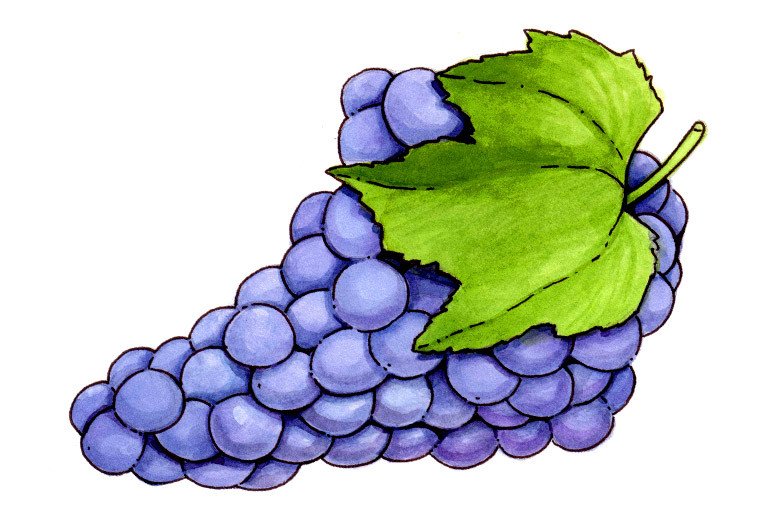
Common Names
- Grape Seed Oil
- Grape Seed Extract
- Muskat
For Patients & Caregivers
Tell your healthcare providers about any dietary supplements you’re taking, such as herbs, vitamins, minerals, and natural or home remedies. This will help them manage your care and keep you safe.
Grape seeds from wine grapes are used to make grape seed extract. It contains chemicals that help prevent many chronic conditions.
Grape seed extract comes as tablets, capsules, liquid extracts, and tinctures. Extracts are stronger and have less alcohol than tinctures.
Grape seed extract is used to:
- Lower high cholesterol.
- Reduce inflammation (swelling).
- Treat atherosclerosis (ath-uh-roh-skluh-roh-sis) (when your arteries get hard because of a buildup of fats and cholesterol).
Grape seed extract has other uses, but doctors have not studied them to see if they work.
Talk with your healthcare provider before taking grape seed extract supplements. Herbal supplements are stronger than the herbs you would use in cooking.
Some herbal supplements can also affect how medications work. For more information, read the “What else do I need to know?” section below.
Side effects have not been reported.
- Talk with your healthcare provider if you’re taking blood thinners, such as warfarin (Coumadin®, Jantoven®). Grape seed extract may increase your risk of bleeding.
For Healthcare Professionals
Grape seeds are obtained as a by-product of wine production and ground to produce grape seed oil. Grape seed extract is marketed as a supplement for its antioxidant properties.
Preclinical studies of grape seed proanthocyanidin extract (GSPE) suggest cardioprotective (4) (5) and anticancer effects (16) (17). Other studies suggest synergistic effects with doxorubicin (13) or that it can help minimize various drug-induced toxicities (3) (15) (22) (23). Topical application accelerated wound contraction and closure (8).
Preliminary studies in humans suggest grape seed extract can reduce LDL (6), increase total serum antioxidant activity (7), and benefit patients undergoing coronary artery bypass surgery (11). Meta-analyses suggest GSE may lower systolic blood pressure and heart rate, but are mixed on whether it improves lipid, glucose, and inflammatory markers (24) (25). Other data suggest it may provide adjunctive benefit in patients with diabetic retinopathy (26).
Supplementation with grape seed may be associated with decreased risk of hematologic malignancies (21). In prostate cancer patients, a pulverized muscadine grape skin from Vitis rotundifolia was safe and tolerable (12), but clinical benefit needs to be assessed. Oral GSPE did not improve radiotherapy adverse effects of tissue hardness, pain, or tenderness in breast cancer patients (14).
Grape seed extract should not be confused with Grapefruit seed extract (also known by the acronym GSE), which has different biological effects.
Red wine grapes; compounds in grape seed extract are also found naturally in many other foods including fruits, vegetables, chocolate, and tea.
- High cholesterol
- Inflammation
- Atherosclerosis
Proanthocyanidins and minor phenolic compounds found in GSPE are also found naturally in many foods including fruits, vegetables, chocolate, and tea. People generally consume 460-1000 mg/day of these combined substances (9). GPSE has protective effects on doxorubin-induced cardiotoxicity (3). Cardioprotective effects may be due to its ability to modulate anti-apoptotic genes and modify molecular targets such as DNA damage and repair, lipid peroxidation, and intracellular calcium homeostasis (5).
Gastrointestinal upset (26)
- Anticoagulants / antiplatelets: In vitro, grape seed has antiplatelet activity, and may increase the risk of adverse effects of these drugs (1) (19). Clinical relevance has yet to be determined.
- CYP3A4 substrates: In vitro, GSE inhibits CYP3A4 and may affect the intracellular concentration of drugs metabolized by this enzyme (18). Clinical relevance has yet to be determined.
- UGT substrates: Grape seed modulates UGT enzymes in vitro and may increase the side effects of drugs metabolized by them (20). Clinical relevance has yet to be determined.